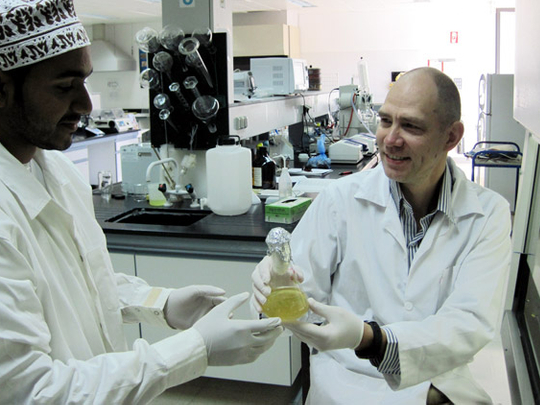
Muscat: Dr. Sergey Dobretsov has demonstrated that many marine invertebrates and microorganisms in Oman are capable of producing inhibitors of "bacterial language", which can hinder quorum sensing, a process that enables bacteria to co-ordinate their behaviour and respond quickly to environmental changes, such as the availability of nutrients, other microbes or toxins in their environment.
"The discovery that many bacteria use 'chemical language' to coordinate virulence has pointed out a new, promising target for antimicrobial drugs," said Dr. Dobretsov, who is an Assistant Professor in the Department of Marine Sciences & Fisheries of the College of Agricultural & Marine Sciences at Sultan Qaboos University.
He pointed out that traditional treatment of infectious diseases was based on compounds that aim to kill or inhibit bacterial growth. "A major concern with this approach is the frequently observed development of resistance to antimicrobial compounds. The discovery of bacterial-communication systems (quorum sensing systems), which orchestrate important temporal events during the infection process, has afforded a novel opportunity to ameliorate bacterial infection by means other than growth inhibition," the researcher added.
Recent quorum sensing investigations have demonstrated that some bacteria, plants and animals are capable of production of compounds that can disrupt the bacteria's ability to communicate and thereby disable bacterial growth and ability to become pathogenic. Organisms are using these quorum sensing inhibitors in order to prevent bacterial infections.
Quorum sensing inhibitors are having certain advantages in treatment of bacterial infections. First, they suppress the growth of pathogens and production of their toxins, thus giving the body an extra time to eradicate these bacteria through the natural immune defence. Second, since these inhibitors are not killing the bacteria they also do not force them to mutate and resistant strains will be unlikely to occur.
Dr. Dobretsov studied together with Dr. Raeid M. M. Abed, Assistant Professor in the Department of Biology of the College of Science at SQU, cyanobacterial mats from Oman's hot springs.
According to the researchers, microorganisms inhabiting these mats produce quorum sensing inhibitors under natural conditions. Among four investigated springs, namely Hammam, Bowshar, Nakhl and Rustaq, the mats from the Nakhl were the most active.
In comparison with other springs, Nakhl mats had the lowest microbial diversity. This is an important discovery suggesting that cyanobacterial mats are good sources of novel quorum sensing inhibitors.
Dr. Sergey Dobretsov was the first one who isolated a quorum sensing inhibitor from a cyanobacterium. This compound was identified as malyngolide with a help of scientists from the Fort Pierce Smithsonian Research Station located in Florida, USA.
The "alga-like" cyanobacterium Lyngbia majuscula produce malyngolide at the concentrations sufficient to prevent growth of other bacteria on its surface. According to the researchers, malyngolide has the capacity to inhibit the growth of dangerous human pathogens by interfering with their quorum sensing. It is interesting that at a high concentration malyngolide works as an antibiotic.
Dr. Dobretsov said that it is a known phenomenon and according to his study about 20 per cent of known antibiotics are inhibiting "bacterial language" at extremely low nano- and milli- molar concentrations.
Samiha Al Kharusi, an MSc student of Biology Department, has been investigating microbial diversity and bioactivity of microorganisms living in extremely saline pools of Wadi Maqshan in south-eastern Oman in Al Wusta province under the supervision of Dr. Abed and Dr. Dobretsov. This investigation revealed that most of microbes from these pools produce different quorum sensing inhibitors.
The SQU researchers are planning to isolate these bioactive compounds and further investigate their potential in the future. The study done by SQU team highlight the high biotechnological potential of microorganisms inhabiting the Sultanate and suggests that their quorum sensing inhibitors can be used as new drugs to control antibiotic resistant infections in the future.










